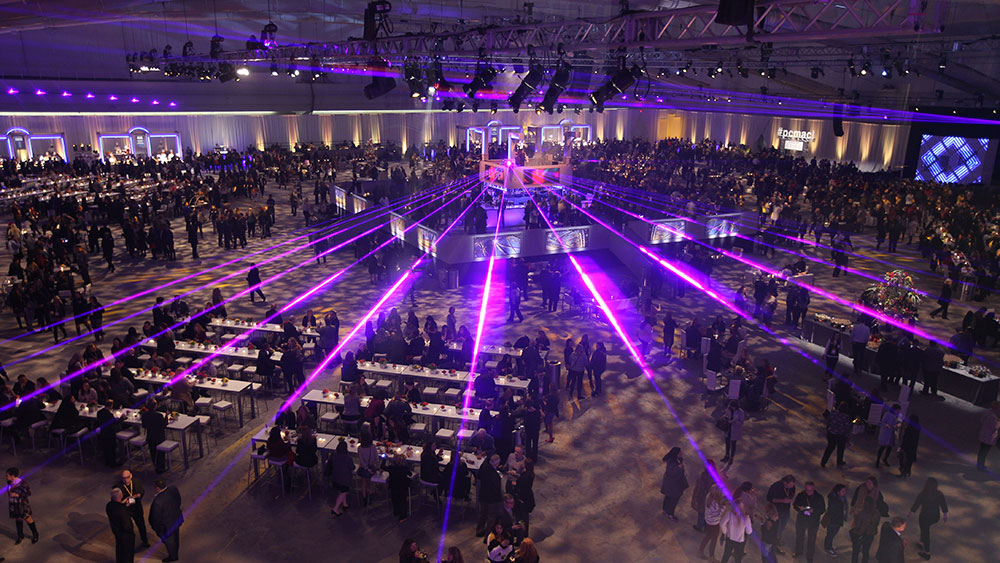
Event organizers are responsible for paying ASCAP and BMI licensing fees for music at their events, like the opening reception of PCMA’s Convening Leaders 2019 in Pittsburgh. (Jacob Slaton Photography)
PCMA’s Catalyst community offers members a platform to ask each other questions, share ideas, or, as the website says, “communicate and collaborate.” Each month Convene features some of the most popular topics in the forum. Here’s a sampling from a recent Catalyst discussion.
For a Song
“We have a large scientific conference that ends the week with a big party,” Johanne Stogran, director of conferences, Botanical Society of America, explained on the PCMA Catalyst forum. “We have had a DJ and live bands — it varies. I received notice from ASCAP that I owe them money for a license to play music at the conference. Previously, we were told it is the performer and the venue that are responsible for the license and for complying with the rules. What is your experience? Any help is appreciated!”
I have always thought it was the event organization that needs to have the license. I actually learned this at a PCMA webinar on this exact topic. My organization does have our own license.
— Jennifer Braun, director, production, National Association of Realtors
I agree with you, Jennifer. I believe this is the organization’s responsibility. We use a DJ on our final event night too but pay an annual fee to ASCAP for these meetings.
— Heidi C. Borter, meetings manager, American Society of Regional Anesthesia
Our association pays ASCAP and BMI annually for music at our events. I questioned paying more than one organization, but it’s my understanding songwriters can be represented by one of three organizations. If you play a song with multiple songwriters who are represented by different organizations then you would need to pay each organization for use of the song. Our playlist varies so we have continued paying both so we are mostly covered.
— Lori Marker, director of meeting management, National Athletic Trainers’ Association
Based on the info you provided, it does sound as if your group as the host is responsible for the ASCAP license fees. From my understanding, it is not the responsibility of the venue or performer. We have our big conference in Columbus every November at the convention center. We pay both the ASCAP and BMI license fees associated with this event. Hope that helps.
—Simon Buehrer, CMP, conference and events manager, Ohio Center for Autism and Low Incidence (OCALI)
It is the responsibility of the event organizer to obtain an ASCAP, BMI, or other licensing. The licenses can only be held by the event organization. While many venues and vendors have licensing, it does not cover your event. Their licensing only covers them. … The licensing is dependent upon how you are using it at your event and it is important to know what your license covers. Unless you produce the content, you need to have the rights to that content. This applies not only to music, but sporting events, movies, graphics, and any other form of content.
Ultimately, you should have both ASCAP and BMI for your events if you are playing any sort of music. Both organizations are great at helping you through the process, especially if you are doing it ahead of your event. Most production partners should also be able to help provide you with some direction for your event. BMI offers a discount to associations so make sure you take advantage of that if that category fits you.
— Carter Dunham, director, global Accounts, PRG Corporate & Tradeshow Services
You are getting good advice. Music licensing is the responsibility of the end-users. Venues, production, AV, musicians, DJs, etc., may have a different license, but your meeting is not covered under those agreements. You must have your “performing rights” license. In the scheme of things, it’s a minor pain with all else you have to worry about, but it reflects copyright law. One “blanket” license from BMI and ASCAP authorizes all uses of music from walk-in and general session bumper music to celebrity acts, dance bands, and DJs. Licenses have recently increased [in price], but are still relatively affordable, based on the number of attendees and meetings.
— Michael Owen, managing partner, EventGenuity, LLC
